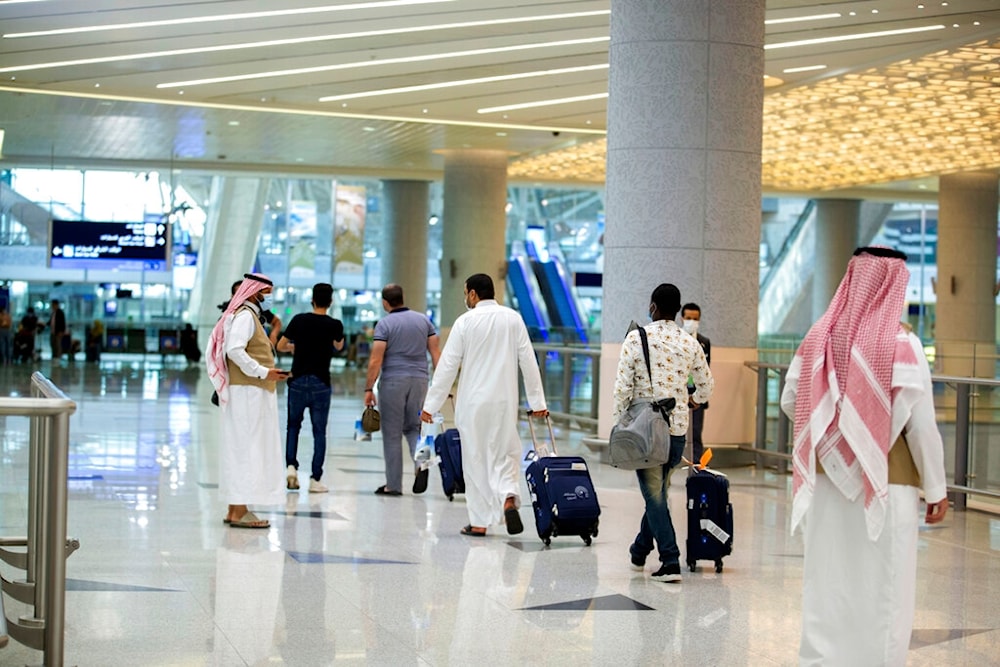Iran, Saudi Arabia to begin talks on direct flights
According to an Iranian official, there are no restrictions for initiating regular direct flights between various cities of Iran and Riyadh.
-

Pilgrims arrive to King Abdulaziz Airport for the Hajj pilgrimage to Mecca, in Jeddah, Saudi Arabia, Saturday, July 25, 2020 (Saudi Ministry of Media via AP)
Head of the Iranian Civil Aviation Organization Mohammad Mohammadi Bakhsh announced on Sunday that Iran and Saudi Arabia are set to kick off official talks in the coming week on the establishment of direct flights.
"There are no restrictions as regards the launch of direct flights to Riyadh, and these flights could be launched on a regular basis ... between different cities of Iran and Saudi Arabia ... Final talks will be held by a working group with representatives ... of the two countries, and this special working group will begin its work starting next week," the official was quoted by the Iranian Labour News Agency as saying on Saturday.
In March this year, Iran and Saudi Arabia, with the mediation of China, reached an agreement to reestablish diplomatic relations. These ties had been severed in 2016 following the attacks on Saudi Arabia's diplomatic missions in Iran, triggered by the execution of Shiite preacher Nimr al-Nimr. The formal accord outlining the restoration of diplomatic relations and the preparations for opening diplomatic missions was signed by the foreign ministers of both countries in April.
Later in November, Iranian President Ebrahim Raisi embarked on a significant journey to Riyadh, the capital of Saudi Arabia, for a summit in Gaza. This visit marked a historic event as it was the first time an Iranian leader had visited the Saudi capital since the restoration of diplomatic ties between the two nations.
Read more: Xi intervened 'personally' in Saudi-Iran agreement: Wang Di
Normalization talks with 'Israel' halted?
On September 17, the Saudi Elaph news website reported quoting an unnamed Israeli official that Saudi Arabia has informed the Biden administration that it will halt normalization talks with "Israel".
The official who works at the Israeli Prime Minister's office said that the possibility of an agreement has been nullified as far-right figures, such as Itamar Ben-Gvir and Bezalel Smotrich, in Benjamin Netanyahu's coalition government are against any sort of rapprochement with the Palestinians, and thus with the Saudis.
"Saudi Arabia has intelligently brought the Palestinians into the talks to control the form of the agreement with the Israelis, its timing, and the demarcation of their (Palestinian Authority's) independent state's borders without external interference and without Israeli imposition, as they tried to do in the Abraham Accords [normalization agreements], which failed to reach any agreement with the Palestinians," the Saudi news website reported.
Two months later, the Saudi Arabian Minister of Investment Khalid al-Falih confirmed that Saudi-Israeli normalization "remains on the table."
According to al-Falih, the war that broke out on October 7 was a "setback" that allegedly "clarified" the reasoning behind Saudi Arabia's insistence that the "resolution of the Palestinian conflict has to be part of a broader normalization in the Middle East."
While talk of normalization remains prominent, the Saudi Arabian minister found it funny that anyone would ask whether economic tools, such as oil price alterations, could be used to impose a ceasefire in the occupied Palestinian territories.
When asked about it, al-Falih laughed according to Bloomberg, and responded saying "That is not on the table today. Saudi Arabia is trying to find peace through peaceful discussions."
"The Palestinian people have had their basic rights taken away and the right for statehood and peaceful existence unfulfilled, and it’s time to use this awful situation to bring that to the fore and to resolve it," al-Falih further claimed.
Read more: Top Iranian, Saudi defense officials tackle defense collaboration

 4 Min Read
4 Min Read








